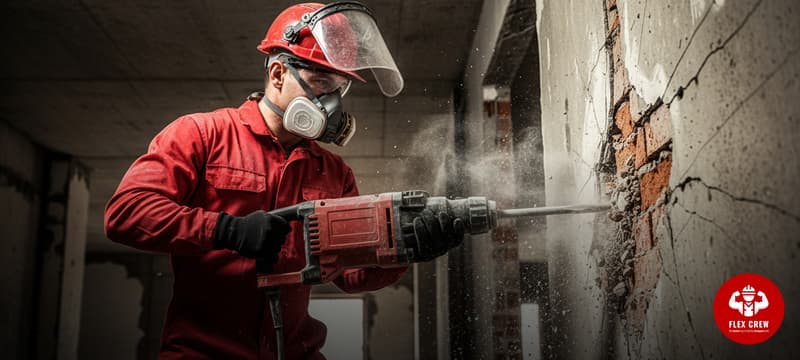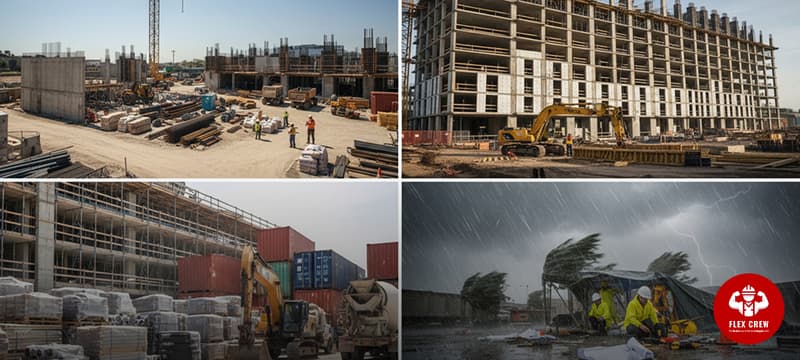Ever wondered who installs all those massive glass windows on skyscrapers or fixes your broken shower door? That's a glazier! Let's dive into this skilled trade that's literally shaping how we see the world.So, What Exactly is a Glazier?
Picture this: you're walking through downtown and admiring those sleek glass facades on office buildings. Or maybe you're at home, appreciating how much natural light floods through your living room windows. Behind all of that beautiful glass work is a glazier.
A glazier is basically a glass specialist in construction. They're among the skilled construction professionals who cut, install, and remove glass (and sometimes glass substitutes like certain plastics) in buildings. Think of them as the artists and engineers rolled into one – they make sure every piece of glass fits perfectly and safely in its intended spot.
You might also hear them called Glass Contractors, which gives you a pretty good idea of what they do. They're responsible for installing glass in window frames, but their job goes way beyond just windows.
What Does a Glazier Actually Do All Day?
Here's where it gets interesting. A glazier's day is never boring because they're constantly working on different types of projects.
The Nitty-Gritty Daily Tasks
First thing in the morning, they're usually looking at blueprints and figuring out exactly what glass needs to be cut and where it's going. Then comes the precision work – cutting and grinding glass to those exact shapes and dimensions. No room for error here because, well, glass doesn't forgive mistakes!

They spend a good chunk of their day measuring spaces and installing glass or mirrors in all sorts of places: window frames, skylights, display cases, showers, bathtubs, and even those fancy solariums some people have. And when something breaks? They're the ones carefully removing the old, broken glass before installing the new stuff.
One thing that might surprise you is how much they need to know about different types of glass. They're constantly choosing the right glass for each specific job and making sure everything is sealed properly so it's completely watertight.
Working on Homes vs. Commercial Buildings
When glaziers work on residential projects, they're often in your neighborhood installing or replacing everyday items like windows, mirrors, shower doors, and bathtub enclosures. One day they might be fixing a cracked bathroom mirror, and the next they're installing energy-efficient windows during a home renovation.
But the real excitement happens on commercial projects. We're talking about installing room dividers in fancy offices, creating stunning display cases for retail stores, putting in security windows, and yes – those impressive curtain walls on skyscrapers that make you crane your neck to look up. They work on office buildings, retail stores, restaurants, and basically anywhere glass plays a role in making a space both functional and beautiful.
What Skills Do You Need to Become a Glazier?
Let's be real – this isn't a job where you can just wing it. Glaziers are professional artisans who need a pretty specific set of skills.
The Physical Side of Things
First off, you need to be in decent physical shape. We're talking about lifting, carrying, and installing heavy glass panels all day long. And here's something that might make you nervous just thinking about it – glaziers often work at incredible heights. They literally tackle extraordinary challenges with glass, sometimes dozens of stories up in the air.
You'll be working both indoors and outdoors, and weather doesn't always cooperate. Rain, wind, extreme temperatures – glaziers work through it all because construction projects have deadlines.
The Technical Skills That Matter
The precision required in this job is honestly pretty impressive. You need rock-solid hand-eye coordination because you're constantly aligning glass within frames and applying seals. One small mistake can mean starting over with an expensive piece of glass.
Blueprint reading is huge – you can't just eyeball these installations. You need to understand technical drawings and specifications perfectly. Measuring expertise is equally important because custom glass installations require accuracy down to fractions of an inch.
Problem-solving skills come into play daily. You're constantly choosing the right type of glass for specific applications, and each job presents unique challenges. Plus, you need to understand safety protocols inside and out because, let's face it, working with glass can be dangerous.
Getting the Right Training
Most states require you to complete a 3-year apprenticeship program, and honestly, that's time well spent. These programs combine classroom instruction with hands-on experience, covering everything from safety procedures to advanced glass cutting techniques and installation methods.
It's not just about learning to cut glass – you're learning about different types of glass, how they behave in different environments, building codes, and all the specialized tools and equipment that make this job possible.

Let's Talk Money – What Do Glaziers Actually Earn?
Here's what everyone wants to know: what's the paycheck like?
The median annual wage for glaziers hit $55,440 in May 2024, but here's the thing – that's just the middle of the road. Experienced glaziers working in major cities or specializing in complex commercial projects can earn significantly more. We're talking about skilled professionals who are in demand.
The job outlook is pretty solid too. Employment is projected to grow 4 percent from 2023 to 2033, with about 5,600 openings projected each year. That growth is driven by some pretty reliable factors: new construction keeps happening, buildings always need renovations, everyone wants energy-efficient windows these days, and modern architecture just loves glass.
Safety First – Because Glass Can Be Dangerous
Let's not sugarcoat this – working with glass presents some real risks. You're dealing with sharp edges that can cause serious cuts, glass can break unexpectedly during installation, and working at heights on scaffolding or lifts adds another layer of danger. Plus, all that heavy lifting can take a toll on your body.
But here's the good news: professional glaziers undergo extensive safety training and use specialized protective equipment. The industry takes safety seriously because it has to. When you hire professional glaziers, you're getting people who know how to minimize these risks while getting the job done right.
Career Paths – Where Can This Trade Take You?
One of the cool things about becoming a glazier is that you can specialize in different areas based on what interests you most.
Some glaziers focus on residential work – they love working with homeowners and being part of home improvement projects. Others get into commercial glazing and work on those impressive office buildings and retail spaces. There's also architectural glazing for people who want to work on custom and decorative glass installations.
You can even branch out into automotive glazing (think windshield replacement and repair) or security glazing, where you're installing bulletproof and security glass – pretty specialized stuff.
Many glaziers eventually advance to supervisory roles, start their own businesses, or specialize in high-end architectural projects. Like other skill trade workers glaziers have excellent opportunities for career advancement and specialization. If you're looking for a secure career with room for growth, this trade definitely fits the bill.
Why Should You Hire Professional Glaziers?
If you're a contractor or project manager, you might be wondering why you should specifically seek out professional glaziers instead of just any construction worker who can handle glass.
Professional glaziers bring precision and expertise that you just can't get otherwise. They know proper installation techniques, understand building codes, can optimize for energy efficiency, and ensure long-term durability. Plus, they carry insurance and follow strict safety protocols, which protects both your workers and your business from liability.
When you're looking to hire glaziers, focus on experience level, verify their certifications and apprenticeship completion, check their safety record, and always contact references. Make sure their specialization matches your project needs.
The Future Looks Bright (and Glassy)
The glazing industry isn't standing still. We're seeing some pretty exciting developments like smart glass that can change transparency electronically, advanced energy-efficient glazing with special coatings, more sustainable and recycled glass options, and digital tools that help with precision cutting and installation planning.
Glaziers today are part of shaping the future of architecture, sustainability, and innovation. It's more than just installing glass – it's about creating spaces that are beautiful, functional, and environmentally responsible.
Bottom Line
Glaziers play a crucial role in construction, combining technical skill with artistic vision to create the glass installations we see everywhere. The steady job growth and competitive wages make it an attractive career option for people who want hands-on construction work with room for creativity and specialization.
For contractors and project managers, partnering with experienced glaziers means you get quality installations that enhance both the function and appearance of your buildings.
Looking to hire skilled glaziers for your construction projects? FlexCrewUSA connects contractors with qualified construction professionals across North America. Contact us today to discuss your staffing needs and find the right glaziers for your team.
Quick Answers to Common Questions
How long does it take to become a glazier?
Most glaziers complete a 3-year apprenticeship program that combines classroom learning with real-world experience.
Is glazing dangerous work?
While there are risks involved, proper training, safety equipment, and following protocols significantly reduce workplace hazards.
What's the difference between a glazier and a window installer?
Glaziers have much broader skills and work with all types of glass installations, while window installers typically focus just on window replacement.
Do glaziers work year-round?
Yes, they work throughout the year, though extreme weather can sometimes limit outdoor work.


